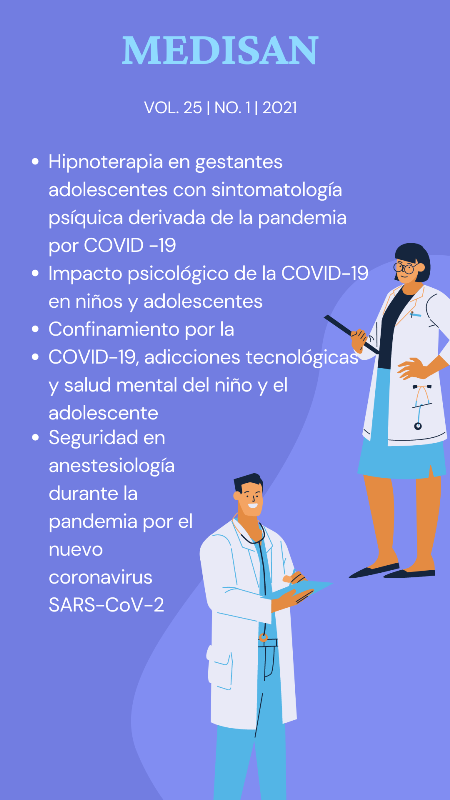Quality of the elderly care in two polyclinics from Santiago de Cuba municipality
Keywords:
elderly, frail elderly, population aging, comprehensive care to the elderly, quality of primary health care.Abstract
Introduction: The increase of population aging is an universal fact and one of the fundamental problems of this century, since the comprehensive health of elderly is directly related to their life quality.
Objective: To evaluate the process of elderly care in units of the health primary level.
Methods: An investigation in health systems and services of evaluative type of the quality of the elderly care in two polyclinics from Santiago de Cuba was carried out (Carlos Juan Finlay and Camilo Torres Restrepo teaching polyclinics), during 2018, for which validated forms were already implemented. A sample of 260 and 40 medical records was taken, respectively from a universe constituted by 11 992 patients belonging from both health institutions and by 280 medical records of frail elderly assisted by the work basic groups.
Results: The evaluation carried out to elderly in the family doctor offices was considered as poor; just a tenth part of the total was referred to the geriatrician; the consultations and home visits were fulfilled according to schedule just in a third part of the patients, what led to very unfavorable results in fundamental aspects as the realization of the health periodic exam, geriatric scale of functional evaluation and elderly evaluation. On the other hand, in the health basic team neither health periodic exam was taken into consideration as the tool with which elderly are evaluated in the social, functional, psychological and biomedical aspects, nor the value of medical follow up schedule; all this influenced by an unfavorable interrogation and physical exam.
Conclusions:The quality of the care process in the family doctor office and in the basic group of work evaluated as poor evidences the lack of competence in this respect and the ignorance of what is established for an appropriate care to the elderly.
Downloads
References
2. Organización Panamericana de la Salud; Organización Mundial de la Salud. La 69a Asamblea Mundial de la Salud culmina sus sesiones. Washington, D.C: OPS; 2016 [citado 22/11/2019]. Disponible en: https://www.paho.org/hq/index.php?option=com_content&view=article&id=12115:69-world-health-assembly-closes&Itemid=135&lang=es
3. Amaro Cano MC. El envejecimiento poblacional en Cuba, desde el prisma de la epidemiología social y la ética. Revista Anales de la Academia de Ciencias de Cuba. 2016 [citado 22/11/2019];6(2). Disponible en: http://www.revistaccuba.cu/index.php/revacc/article/view/340/340
4. Envejecimiento en Cuba: principal reto demográfico (+ Infografía). CUBAHORA. 2019 May [citado 22/11/2019]. Disponible en https://www.cubahora.cu/sociedad/envejecimiento-en-cuba-principal-reto-demografico
5. Cuba. Ministerio de Salud Pública. Programa de Atención Integral al Adulto Mayor. La Habana: MINSAP; 2015 [citado 22/11/2019]. Disponible en: http://files.sld.cu/redenfermeriacomunitaria/files/2015/01/programa-de-atencion-integral-al-adulto-mayor.pdf
6. Lilia Turquina González Cárdenas, Leonardo Cuesta Mejías, Lizette Pérez Perea, María Clarivel Presno Labrador, Ivonne Elena Fernández Díaz, Teresa de la Caridad Pérez Díaz, Sarah Elisa Guerrero Chacón, Caridad Pérez Charbonier. El Programa del médico y enfermera de la familia: desarrollo del modelo de atención médica en Cuba. Rev Panam Salud Publica. 2018 [citado 22/11/2019];42. Disponible en: https://iris.paho.org/bitstream/handle/10665.2/34902/v42e312018.pdf?sequence=5
7. Pons Raventos ME, Rebollo Rubio A, Jiménez Ternero JV. Fragilidad: ¿Cómo podemos detectarla? Enferm Nefrol. 2016 [citado 22/11/2019];19(2):170-3. Disponible en: http://scielo.isciii.es/scielo.php?script=sci_arttext&pid=S2254-28842016000200010&lng=es
8. Moliner Molins C, Gardeñes Morón L, Herrera García A, Pérez Centelles MC, Reig Calpe P, Sans Corrales M. Ancianos frágiles: ¿cuántos y por qué? SEMERGEN. 2007 [citado 22/11/2019];33(6):287-92. Disponible en: https://www.elsevier.es/es-revista-medicina-familia-semergen-40-articulo-ancianos-fragiles-cuantos-por-que-13108197
9. Ignacio Aladre ¿Qué es ser un anciano frágil? Universidad Maimónides. 22 Jul 2016 [citado 22/11/2019]. Disponible en: https://gerontologia.maimonides.edu/2016/07/que-es-ser-un-anciano-fragil
10. De Hombre Cabrera E. Grupo Básico de Trabajo [citado 22/11/2019]. Disponible en: https://instituciones.sld.cu/puplaza/grupo-basico-de-trabajo
11. Sánchez Barrera O, Martínez Abreu J, Castel Florit-Serrate P, Gispert Abreu EA, Vila Viera M. Envejecimiento poblacional: algunas valoraciones desde la antropología. Rev Med Electrón. 2019 [citado 22/11/2019];41(3). Disponible en: http://scielo.sld.cu/scielo.php?script=sci_arttext&pid=S1684-18242019000300708
12. Chan M. Organización Mundial de la Salud, 2015. Informe mundial sobre el envejecimiento y la salud. Ginebra: OMS; 2015 [citado 22/11/2019]. Disponible en https://apps.who.int/iris/bitstream/handle/10665/186471/WHO_FWC_ALC_15.01_spa.pdf;jsessionid=FD9A4EE2E6A359D127AF7B04F3D513F3?sequence=1
13. Datosmacro.com. Cuba-Esperanza de vida al nacer. 2017 [citado 22/11/2019]. Disponible en: https://datosmacro.expansion.com/demografia/esperanza-vida/cuba
Published
How to Cite
Issue
Section
License
All the articles can be downloaded or read for free. The journal does not charge any amount of money to the authors for the reception, edition or the publication of the articles, making the whole process completely free. Medisan has no embargo period and it is published under the license of Creative Commons, International Non Commercial Recognition 4.0, which authorizes the copy, reproduction and the total or partial distribution of the articles in any format or platform, with the conditions of citing the source of information and not to be used for profitable purposes.





